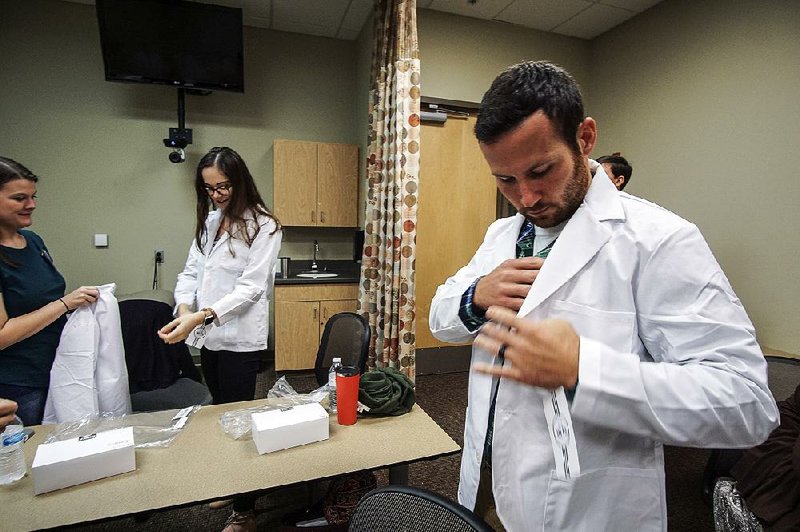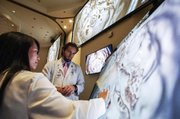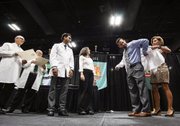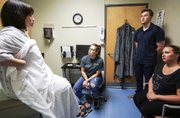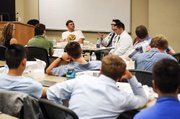After John Wilson pulled a number from a hat outside the library at the University of Arkansas for Medical Sciences College of Medicine, he went through the doors and scanned the sea of elevated black signs bearing yellow numbers, 1 through 29.
Way in the back, next to a metal door that opened to an elevator, he spotted "#2." Wilson bobbed and weaved through the room that would've been considered spacious if it weren't for his fellow brand-new medical students crowded at dozens of rectangular tables.
Their first day of medical school earlier this month came after months of an excruciating process that began with passing the Medical College Admission Test, followed by multiple applications, interviews and, finally, acceptance into what hopefully was one of their top three choices.
Nationwide, 51,680* doctor hopefuls vie for only 21,338 slots in schools, according to the Association of American Medical Colleges. That means only about 41.2 percent of applicants are accepted.
At UAMS, 174 students in this fall's freshman class were selected from 2,437 applicants from 43 states. That's about 7 percent.
Twenty-two in the class had applied twice, and six found that their third time was the charm.
The class includes 161 Arkansas residents and 13 from other states including Arizona, California, Louisiana, Florida, Missouri, North Carolina, Oklahoma, Texas and Virginia.
With the medical college being a state institution, Arkansas Code 6-64-406 requires that 70 percent -- or 105 -- of the first 150 positions be equally distributed among the four congressional districts.
The remaining slots can be filled by other Arkansas residents. Only 22 of the first 150 can be from out of state.
"That's a very elite group to be a part of," Wilson said. "I was a bit humbled by the honor of being selected alongside such a strong group of classmates."
Wilson, a Conway native, began the application process in late June 2017 and spent the following year applying to his top three schools: UAMS College of Medicine, the New York Institute of Technology's College of Osteopathic Medicine on the Arkansas State University Jonesboro campus, and the Uniformed Services University of the Health Sciences in Bethesda, Md.
It was his first time applying, and he was accepted to all three.
Wilson, like the majority of medical students, began his journey by earning a biology undergraduate degree. His is from the University of Central Arkansas in Conway.
A biology degree "is pretty much the usual path," Wilson said. "I have a minor in physical science."
Of the 174 students in the class of 2022, about 44 percent, or 76, hold degrees in biology and 20 percent, or 35, majored in biochemistry.
But that traditional path is broadening to include more of the social sciences, said Dr. Tom South, assistant dean for admissions at UAMS College of Medicine.
This year's freshmen hold degrees in fields like anthropology, economics, psychobiology, and medicine health and society. Some ventured even further off the beaten path to business, computer science, math, writing, and telecommunications and film.
A bachelor's degree isn't a standard for admission to the UAMS College of Medicine.
"But we can't remember the last time we admitted someone who didn't have one," said Dr. Richard Wheeler, executive associate dean for academic affairs.
MEETING THE TEAM
With barely enough elbow room to pull out a chair, Wilson claimed a seat at one end of Table #2.
Seated around him were five fellow students:
• Joseph VanSoy, 23, of Jonesboro. Married, no children.
• Jordan Steele, 24, of Newark. Single.
• Jeffrey Curran Henderson, 25, of Memphis. Married, no children.
• Anna Brickell, 22, of Caraway. Single.
• Ethan Joseph Echols, 22, of Fort Smith. Single.
At their table, contents of the table-mates' overstuffed backpacks spilled onto the floor around them. Wilson arrived with only a pen.
His table-mates were dressed in jeans, shorts, T-shirts, deck shoes and cowboy boots. Wilson wore a crisp blue-and-green plaid shirt, creased khaki slacks and shiny brown dress shoes.
The conversation around him vibrated with excitement and nervous laughter, punctuated occasionally with anxious murmurs. Wilson sat mostly silent, but politely answered table-mates' questions.
"So," Steele began. "How old are you?"
Wilson snorted, then smiled broadly.
"I'm 31."
The average age of this year's freshman is 22.5. The class's oldest freshman is 37.
Twenty are married -- two to each other. Among the class members, they have 13 children.
Wilson is married to Amanda, and they have two children: Alex, 2, and J.K., a 4-year-old who started pre-kindergarten at the same time his dad entered medical school.
"Family" punctuates every piece of Wilson's journey to becoming a doctor.
He was 12 when his father, Bob Wilson, was thrown from a horse. His mother, Paula Wilson, was on a mission trip in Mexico at the time, so the task of getting Wilson's injured father to the hospital fell to him.
"It was eye-opening to see the whole process from start to finish," Wilson said of his father's medical care. "From bringing him into the emergency room to seeing him treated and taken care. It kind of sparked the interest there, I guess."
Also, Wilson watched his sister, Dr. Katie Yarnell, become a psychiatrist.
After he was married in 2012, Wilson's focus shifted to providing a good life for his wife and future children. A career in medicine would provide that, he decided.
Wilson knows that navigating medical school while balancing family life will probably be his greatest challenge over the next four years.
"I have to make sure I have enough time for studying, to take the exams and set myself up to be a good doctor," he said. "But at the same time I have to make sure I don't lose track of the kids and that I'm able to bond with them and spend time with my wife."
Though considered a "non-traditional" student, Wilson fits the profile sought by the UAMS College of Medicine acceptance committee.
The 15-member committee, dictated by Arkansas law, consists of six faculty members, two members from each of the state's four congressional districts and one at-large member. They cannot serve longer than four years and have to rotate off for at least a year before they can be reappointed.
While the current committee is comprised completely of physicians, there is no requirement that those who serve must be doctors.
"We've had legislators, water company executives and even reporters serve," Wheeler said.
The committee looks for more than just strong test scores and undergraduate grades, he said. The committee also looks at the "whole person" -- life experiences, volunteer work, whether the applicant is a first-generation college student, the applicant's motivation for going to medical school.
"Grades and MCAT scores, and things like that, are looked at to determine if the committee feels they have the intellectual horsepower to make it through medical school, but we are also intensely interested in what kind of person they are in terms of their humanity," Wheeler said.
The committee also looks at something much simpler.
"If you come here and you want to do this -- really, really want to do this -- that will cover up a lot of sins," Wheeler said.
Perhaps one of the biggest deciding factors is the "Personal Statement."
The abbreviated autobiography is required of all allopathic medical school applicants and typically includes the person's motivation for pursuing a career in medicine as well as stories of the applicant's challenges and triumphs. As examples:
"What defines a person is how setbacks can build character and identity. My unwavering determination did not allow failure to have the last word."
*
"I feel privileged to have now graduated college in a developed country given the conditions of my upbringing. It saddens me that I could not help my mother and all those who died from preventable and curable diseases."
*
"I'm not sure who decided that 'everything happens for a reason' is the best thing to say to a grieving mother, but the pain I felt hearing those words was visceral. I wanted to scream. I don't believe everything happens for a reason, but I do believe we each have the power to create purpose from our pain."
Dr. Jeanne McLachlin, director of admissions and recruitment for the College of Medicine, told the new medical students that she read through "every single line" of the personal statements searching for "an indication of your motivation for medical school, your commitment to that process, but also your determination and resilience in your journey to medical school."
McLachlin said many of the freshmen had endured traumatic and transformative events that were clearly a part of their motivation to become doctors.
"I think that all of you shared the capacity to persevere," she said. "And I think that, according to one of your classmates, perseverance is critical to your success in medical school."
Perseverance is something Wilson has in spades, his mother Paula Wilson said.
"When he sets his mind to do something, I expect it to get done," she said. "He's very determined. He doesn't get stressed out easily and is very calm natured. He always has been."
WILSON'S JOURNEY
In the middle of a rousing and enthusiastic speech by Vanessa Lewis, student services manager, Wilson glanced apologetically at his table-mates, grabbed his cellphone and stepped away.
His classmates looked puzzled when he returned. He murmured: "Commissioned."
At 11 a.m. on the first day of his medical school freshmen orientation, Wilson also was commissioned as a 2nd lieutenant and was later sworn in at the Army medical recruiter's office as a reserve officer.
"I am no longer active duty enlisted," Wilson said.
And because of his past service and future commitment to the Army, Wilson will finish his full medical degree with zero student loan obligations.
Wilson attended UCA on an academic scholarship. He then joined the Army, where he was accepted to the Uniformed Services University's Enlisted to Medical Degree Preparatory Program.
The intensive two-year program, which began in 2014, gives students clinical exposure, pre-medical course work and mentoring in preparation for the competitive medical school application process. While he was in the program, Wilson continued to receive military pay and benefits, and all educational expenses were paid.
To cover the cost of attending the UAMS College of Medicine -- which has an annual tuition of just over $33,000, for a four-year total cost of about $132,000 -- Wilson was accepted into the Health Professions Scholarship Program.
The program provides him a $20,000 sign-on bonus and covers full tuition (up to four years), books, equipment and fees. It also provides a $2,200 monthly stipend for food and housing.
Upon graduation, Wilson will serve his residency as an Army captain at a military medical facility. He hasn't decided on a specialty yet, he said.
"They pay for your school and then you have to give your time," Wilson said. "Four for Four."
MILITARY TRAINING
Wilson says little about his nine years in the military.
"I have to be careful with what I can and can't say," he said.
He says he was a special forces medical sergeant who served in Afghanistan, but he won't divulge more.
According to the Army's definition, special forces medical sergeants are "considered to be the finest first-response/trauma medical technicians in the world." Not only are they trained in medical procedures, but they have working knowledge in other medical areas that include dentistry, veterinary care and optometry. Most are qualified divers, parachutists and endurance runners.
They are trained to perform "pretty high-level procedures" and can write prescriptions, Wilson said.
"I was in the field," he said. "We were the first ones on scene for most of the incidents. We would treat people at the point of injury and then get them e-vacked out."
While his training and experience put him ahead of most of the other freshmen, Wilson said it also may present challenges as he adapts to student life.
"I will have to learn how to be a civilian again and how to interact with people in that setting," Wilson said. "It's a little bit different structure."
His wife, Amanda, said she has no doubts that her husband will adapt quickly.
"He can find something in common with everyone, and that makes people feel at ease," she said. "The Army has many people from many backgrounds, and you have to learn to relate to everyone, especially those who you go to war with."
Wilson said he has heard the medical school horror stories.
"Super long hours and incredibly intense pressure," he said. "I think the military experience will help me mitigate that some.
"You learn that when it's time to work, you work. You study when it's study time, and you allot time to spend with your family. You allot time to decompress."
The attrition rate at UAMS College of Medicine is low, Wheeler said. Of the 174 entering freshmen, about 35 won't make it to Match Day -- when medical school seniors find out where they will complete their postgraduate residency training.
The medical college offers services to help students handle the breakneck pace and pressure. The student life department offers everything from emotional support to occasional free meals.
"If you are feeling stressed, I want you to be comfortable raising your hand and saying, 'I'm having some difficulty here,'" UAMS Chancellor Cam Patterson told the freshmen during orientation.
The stress they're feeling now will only increase as training progresses, he warned.
"I want you to be proactive about this. Right through there and eight floors up, there's a gym," Patterson said, pointing toward the open door leading to the elevator. "It costs me $15 a month to join the gym. It costs you less. I encourage you to take advantage of resources like that."
Medical education is now a team sport, Patterson said. Wilson will spend the entire first year with his classmates from Table #2. They will learn together, study together and decompress together.
Students are also "sorted" into one of seven academic "houses" -- similar to J.K. Rowling's Harry Potter novels in which a magical hat sorts Hogwarts students into academic houses.
Faculty advisers -- who also provide frequent individual advising -- encourage the groups to work as teams to plan academic, professional, community service, wellness and social events. The idea is to foster friendships, guidance and support.
Wilson said he has the added benefit of a strong family support system. His parents are retired schoolteachers who live in Batesville and can help with his children. He can go to his sister for academic help since she's already been through the program.
If the going gets really tough, Wilson said he just has to remember why he wanted to become a doctor in the first place.
"My family sustains me. I mean, that's the reason I'm doing all of this, to make a better life for them while still pursuing my goals of helping people and making a difference," Wilson said. "It's all going to be a lot of refocusing, taking time to think about what's important."
RELATED ARTICLES
http://www.arkansas…">Medical Student Oath College of Medicinehttp://www.arkansas…">Road to becoming physician starts with the basics, widens
Metro on 08/26/2018
*CORRECTION: Nationwide, 51,680 people vied for 21,338 slots in medical schools in the 2017-18 school year, according to the Association of American Medical Colleges. That means 41.2 percent of applicants were accepted. Medical schools received 816,153 applications; each potential student submits an average of 16 applications to different schools, according to the association. A previous version of this story incorrectly described the number of applications nationally.

